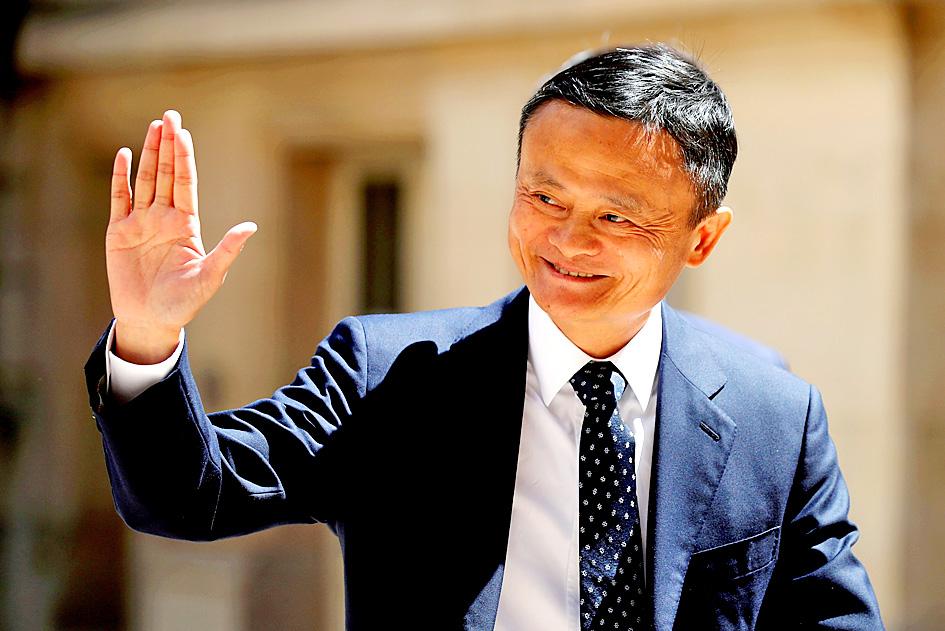China’s central leadership has given billionaire Jack Ma’s (馬雲) Ant Group Co (螞蟻集團) a tentative green light to revive its initial public offering (IPO), two sources with knowledge of the matter said, in the clearest sign yet that Beijing is easing its crackdown on the tech sector.
Ant, an affiliate of Chinese e-commerce behemoth Alibaba Group Holding Ltd (阿里巴巴), aims to file a preliminary prospectus for the share offering in Shanghai and Hong Kong as early as next month, the sources said, declining to be named.
The financial technology giant must wait for guidance from the China Securities Regulatory Commission on the specific timing of the prospectus filing, one of the sources said.

Photo: Reuters
The company’s stock market listing was hastily shelved at the behest of Beijing in November 2020. At the time, it was slated to be valued at about US$315 billion and planned to raise US$37 billion, which would have been a world record.
“Under the guidance of regulators, we are focused on steadily moving forward with our rectification work and do not have any plan to initiate an IPO,” Ant said on its WeChat account late on Thursday.
Ant wants to keep the IPO revival plans low profile pending a formal announcement, after having attracted regulatory attention in its first attempt in 2020 with the waves the offering created as the world’s largest ever equity float, a separate source with direct knowledge of the matter said.
With its economy slowing in a politically sensitive year when Chinese President Xi Jinping (習近平) is expected to secure an unprecedented third term as party leader, Beijing is looking to loosen it grip on private businesses, including tech giants, to help meet a growth target of 5.5 percent.
“They are rolling back on their crackdown to counterbalance the lockdown they’ve had. Any data out of China lately has been dreadful because of lockdowns, and the last thing they want to do is compound that issue. In the next three to six months we are likely to see China’s crackdown unwound,” London-based Equiti Capital market analyst David Madden said.
Chinese Vice Premier Liu He (劉鶴) last month told tech executives that the government supports the development of the sector, and would back firms pursuing listings at home and abroad.
In another sign of Beijing’s softer stance, China’s ride-hailing company Didi Global (滴滴), which has been under a cybersecurity probe since last year, is in advanced talks to buy one-third of a state-backed electric vehicle maker, Reuters reported on Wednesday.
News of the talks comes after the Wall Street Journal reported on Monday that Chinese regulators are set to conclude their investigations into Didi, which could offer hope to investors about its recovery.
The US listed shares of Alibaba, which owns nearly one-third of Ant, were down 7 percent after earlier rising 7 percent in pre-market trading.
“The size of Ant and the IPO will have to be smaller than what was planned in 2020, because the market conditions have changed and cannot be compared to now,” said Dickie Wong (黃德几), executive director of Kingston Securities (金利豐證券) in Hong Kong.

DIVIDED VIEWS: Although the Fed agreed on holding rates steady, some officials see no rate cuts for this year, while 10 policymakers foresee two or more cuts There are a lot of unknowns about the outlook for the economy and interest rates, but US Federal Reserve Chair Jerome Powell signaled at least one thing seems certain: Higher prices are coming. Fed policymakers voted unanimously to hold interest rates steady at a range of 4.25 percent to 4.50 percent for a fourth straight meeting on Wednesday, as they await clarity on whether tariffs would leave a one-time or more lasting mark on inflation. Powell said it is still unclear how much of the bill would fall on the shoulders of consumers, but he expects to learn more about tariffs

Meta Platforms Inc offered US$100 million bonuses to OpenAI employees in an unsuccessful bid to poach the ChatGPT maker’s talent and strengthen its own generative artificial intelligence (AI) teams, OpenAI CEO Sam Altman has said. Facebook’s parent company — a competitor of OpenAI — also offered “giant” annual salaries exceeding US$100 million to OpenAI staffers, Altman said in an interview on the Uncapped with Jack Altman podcast released on Tuesday. “It is crazy,” Sam Altman told his brother Jack in the interview. “I’m really happy that at least so far none of our best people have decided to take them

PLANS: MSI is also planning to upgrade its service center in the Netherlands Micro-Star International Co (MSI, 微星) yesterday said it plans to set up a server assembly line at its Poland service center this year at the earliest. The computer and peripherals manufacturer expects that the new server assembly line would shorten transportation times in shipments to European countries, a company spokesperson told the Taipei Times by telephone. MSI manufactures motherboards, graphics cards, notebook computers, servers, optical storage devices and communication devices. The company operates plants in Taiwan and China, and runs a global network of service centers. The company is also considering upgrading its service center in the Netherlands into a

NOT JUSTIFIED: The bank’s governor said there would only be a rate cut if inflation falls below 1.5% and economic conditions deteriorate, which have not been detected The central bank yesterday kept its key interest rates unchanged for a fifth consecutive quarter, aligning with market expectations, while slightly lowering its inflation outlook amid signs of cooling price pressures. The move came after the US Federal Reserve held rates steady overnight, despite pressure from US President Donald Trump to cut borrowing costs. Central bank board members unanimously voted to maintain the discount rate at 2 percent, the secured loan rate at 2.375 percent and the overnight lending rate at 4.25 percent. “We consider the policy decision appropriate, although it suggests tightening leaning after factoring in slackening inflation and stable GDP growth,”